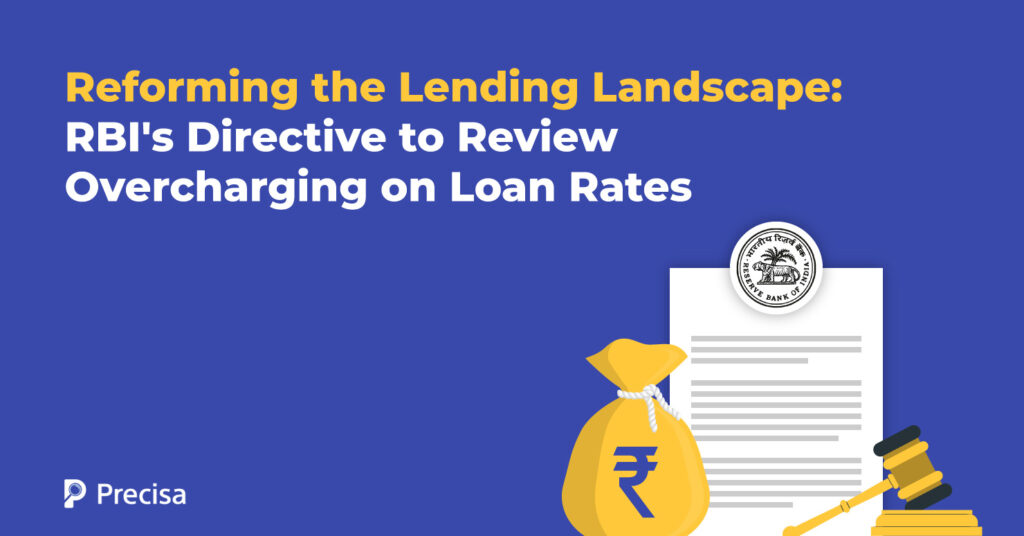Reforming the Lending Landscape: RBI’s Directive to Review Overcharging on Loan Rates

Recently, the RBI has pointed out cases where bank loan rates have been excessively charged, emphasising the need for reform. Addressing this pressing issue, the central bank has taken a stand against unfair lending practices through a recent directive to restore transparency and fairness to the lending process.
The lending practices in India have evolved over time, and the RBI has introduced various guidelines to ensure transparency and fairness.
Back in 2003, the RBI issued the Fair Practices Code, which advocated for transparency and fairness in the way lenders charged interest. However, recent developments have revealed certain unfair practices, prompting the RBI to take corrective action.
During onsite examinations for the period ending March 31, 2023, the RBI uncovered instances of lenders engaging in unfair practices, primarily related to the charging of interest.
This discovery led to the latest directive, which aims to rectify these issues and strengthen fair lending practices. In this blog post, let us learn more about the impact of the directives on lending businesses.
What Unethical Practices are Commonly Adopted by Banks?
The common unfair practices identified by the RBI were as follows:
1. Charging Interest from Loan Sanction Date
Lenders charged interest from the loan sanction date instead of the actual disbursement date. This meant that borrowers paid interest even days or weeks before receiving the funds. This practice significantly impacted borrowers’ financial planning and cash flow.
2. Interest on Loans Disbursed by Cheque
Lenders were charging interest from the date of the cheque, even if they handed it over to the borrower several days later. This created confusion and an unnecessary financial burden for borrowers. The RBI identified numerous such cases, indicating a widespread problem.
3. Full Month Interest Charges
Some lenders were found to be charging interest for the entire month, even if the loan was disbursed or repaid during the month. As a result, borrowers ended up paying interest for periods when they didn’t have the total loan amount, increasing their costs.
What Are the RBI’s Directive to Reform Lending Practices?

The RBI issued a directive on April 29, 2024, to rectify unfair lending practices and promote transparency. The key mandates included:
1. Refund of Excess Interest and Charges
The RBI instructed lenders to refund any excess interest and other charges collected from borrowers due to the unfair practices identified. As RBI officials have pointed out:
“These are matters of serious concern to the Reserve Bank. Wherever such practices have come to light, the RBI, through its supervisory teams, has advised banks to refund such excess interest and other charges to customers. Banks are also being encouraged to use online account transfers in lieu of cheques being issued in a few cases for loan disbursal.”
2. Promotion of Online Loan Disbursal
The central bank encouraged the use of online transfers instead of cheques for loan disbursement, ensuring faster and more transparent fund transfers.
3. Emphasis on Fairness and Transparency
The directive underscored the importance of fair practices and urged lenders to review their policies to ensure transparent interest charging.
What is the Impact on the Lending Landscape?
The RBI’s directive has far-reaching implications for the lending landscape in India, which could bring about positive changes. Here are some of them:
1. Impact on Borrowers
The directive enhances transparency and protection for borrowers. They can now expect fair and transparent lending practices, reducing the risk of financial strain due to excessive interest charges.
With improved transparency, borrowers can make better-informed decisions, understanding the true cost of their loans. This empowers them to choose the most suitable lending options and effectively manage their finances.
2. For Lenders
Lenders are required to make operational changes to comply with the directive, which may come with certain costs. However, embracing fair practices brings long-term benefits. Improved borrower trust leads to a more stable lending environment, fostering stronger relationships between lenders and their customers.
Compliance with the RBI’s directive demonstrates a commitment to transparency, enhancing lenders’ reputations and attracting more borrowers.
3. Overall Market Impact
The RBI’s reforms positively impact the perception of the banking system, boosting trust and confidence. This increased trust contributes to economic stability and growth. Fair lending practices reduce the risk of financial strain on individuals and businesses, leading to a more robust and resilient economy.
The market’s confidence in the banking sector is expected to rise, as reflected in improved banking sector indices post-implementation.
Experience the Power of Data-Driven Lending Decisions
The RBI’s directive to address overcharging on loan rates is a significant step toward ensuring fair lending practices in India. By taking action against unfair practices, the RBI has reinforced its commitment to transparency and protecting borrowers’ rights. This reform sets a clear path for the future of lending in India, where transparency and fairness are prioritised.
Regulatory oversight and fair lending practices are crucial for a healthy financial system. They shield borrowers and ensure equitable economic growth.
As the lending landscape evolves, cloud-based analytics platform Precisa’s user-friendly Bank Statement Analysis software simplifies the evaluation process through automation.
Our innovative solution delivers results in minutes, providing actionable insights on an easy-to-use dashboard. Businesses can confidently make informed lending decisions, minimising risk and maximising growth potential.
Request a free demo today!



